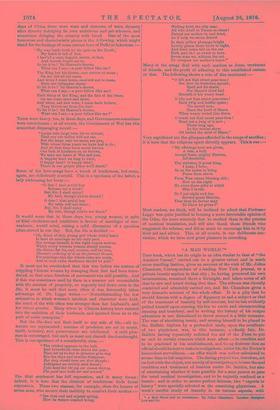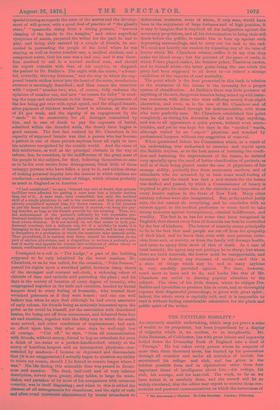"A MAD WORLD."* Tins book, which has its origin in
an idea similar to that of "the Amateur Casual," carried out to a greater extent and in =eh more startling fashion, gives an account of the visit of Mr. Julius Chambers, Correspondent of a leading New York journal, to a private lunatic asylum in that city ; he having procured his own incarceration, remained there a fortnight, and taken notes of all that he saw and beard during that time. The scheme was cleverly contrived and admirably carried out, and Mr. Chambers gives a very dramatic account of the whole affair. It is a pity that he should discuss with a degree of flippancy so sad a subject as that of the treatment of insanity by self-interest, but he has evidently prided himself upon running his fox to earth and circumventing cunning and treachery, and in writing the history of his unique adventure is not disinclined to throw around it a little romance. The ruse of simulating mania, and causing himself to be placed in the Baldric Asylum by a pretended uncle, upon the certificate of two physicians, was, in this instance, perfectly fair, Dr. Baldric having repeatedly solicited the aid of the Press to put an end to certain rumours which were afloat r.s. to cruelties said to be practised in his establishment, and being desirous that an official should be sent to snake investigations, under his, the Doctor's benevolent surveillance,—an offer which was rather calculated to arouse than to lull suspicion. The daring project was, therefore, set on foot with the object, not merely of investigatingat leisure the real condition and treatment of lunatics under Dr. Baldric, but also of ascertaining whether it were possible for a sane person to pass the usual medical investigation, and to be unjustly confined as a lunatic ; and in order to secure perfect fairness, two "experts in lunacy" were specially selected as the examining physicians. A week's careful study of insanity in its various aspects, with
* d Mad Workt and its Inhabitants. By Julius Members. London: fleAspoon Low and 0o.
special training as regards the state of the nerves and the develop- ment of will-power, with a good deal of practice of "the ghastly stare," "spasmodic rising from a sitting posture," "nervous clasping of the hands to the temples," and other superficial
symptoms of mania, prepared the writer for the part he had to play, and being ably assisted by a couple of friends, he sue- oeeded in persuading the people of the hotel where he was
staying, as well as doctor number one, a medical student, and a competent nurse, that his case was a bad one, and it was there- fore resolved to call in a second medical man, and should
his report coincide with that of his confrere, to despatch the patient to Dr. Baldric's. The night with the nurse, "a boast- ful, cowardly, thieving Irishman," and the way in which the sup-
posed lunatic strikes terror into the heart of the mean, mendacious creature is amusingly described ; and then comes the interview with " expert " number two, who, of course, fully endorses the opinions of number one, and sees "no reason for delay" in send- ing the supposed unfortunate to his doom. The requirements of the law being got over with equal speed, and the alleged lunatic, after payment of thirteen weeks' board in advance, at the rate of £4 per week, and the signing of an engagement by the " uncle " to be answerable for all damages committed by him, and in case of death to pay the expenses of burial, admitted within the dreaded walls, the dreary farce begins in good earnest. The first fact realised by Mr. Chambers in his
capacity of supposed lunatic was that a person who has become a patient in one of these private asylums loses all right to have his existence recognised by the outside world. And the cause of this misfortune, as well as the principal obstacle in the way of reform, lies, he considers, in the indifference of the great mass of
the people to the subject, for they, believing themselves so sane as to be for ever secure from derangement, think little of those unhappy persons who have fallen a prey to it, and seldom drew of making personal inquiry into the manner in which asylums are conducted,—a melancholy state of things, which obtains probably as much in England as in America :-
"I had established," he says, "beyond any sort of doubt, that greater facilities were afforded for getting a sane man into a lunatic asylum than out of it. A sane man, once committed, has only the medical skill of a single physician to call to his succour, and that physician is already prejudiced against him, for divers reasons. It is his interest to put the baser motive first, and dismiss it soonest,—to keep the pay- ing boarder, as long as his friends provide for his keeping. Then, too, the endorsement of the patient's infirmity by two reputable pro- fessional brethren leads the asylum physician to hesitate at reversing their sworn decision. It is not merely an act that seems to lack pro- fessional courtesy, but a delicate 'one, for if a mistake be made, it is damaging to the reputation of himself or associates, and in any event, is derogatory to a profession in which the members take unusual pride. Thus prejudiced, it is natural that there should be hesitation on the part of asylum physicians, and a disposition to torture a patient's pro- test of sanity and appeals for release into evidences of either idiocy or mania, confirmatory of the certificate of commitment."
Consigned to a cell in "The Lodge," a part of the building supposed to be only inhabited by the worst maniacs, Mr. Chambers, or as he was called, for the occasion, "Felix Somers," passed his nights upon a wretched pallet, between damp sheets of the strongest and coarsest sail-cloth, a sickening odour of chloride of lime and carbolic acid pervading the place ; and his days in the society of lunatics of every degree of insanity, who congregated together in the halls and corridors, headed by brutal keepers dead to every feeling of humanity, who treated their wretched prisoners as if they were beasts ; and one can well believe him when he pays that although he had every assurance of early release, his friends being as anxiously interested upon the point as he could be himself, yet the association with disordered brains, the being cut off from amusement, and debarred from free air and sunshine, together with the filthy way in which the meals were served, and other conditions of imprisonment, had such an effect upon him, that after nine days he well-nigh lost all courage. "Cut off," he says, "from all communication with friends, without money, forced to beg an attendant for even a drink of ice-water or a pocket-handkerchief, utterly at the mercy of heartless keepers and an incompetent physician—sur- rounded by madmen—I became so depressed and disconsolate that (it is no exaggeration) I actually began to question my ability
to retain my reason, should I be forced to remain longer where I was." His life during this miserable time was passed in dreari- ness and squalor. The food, half-cold and of very inferior description, served upon greasy, slimy tables, in large tin wash- dishes, and partaken of by most of his companions with ravenous
voracity, was in itself disgusting ; and when to this is added the absence of all arrangements for cleanliness, and the sight of rude and often cruel treatment administered by brutal attendants to defenceless creatures, some of whom, if only sane, would have been in the enjoyment of large fortunes and of high position, it is easy to imagine that it required all his indignation against the mercenary proprietors, and all his determination to bring their erll deeds before the public, to enable him to bear up against such depressing surroundings, and to carry out his task to the end.
We need not horrify our readers by repeating any of the tales of horror which Mr. Chambers relates, suffice it to say that they
make the blood creep ; but his account of the game of cards, in which Frisco played casino, the Senator poker, Thaddeus euchre, and he himself whist—the latter game being the one which the party had been supposed to sit down to—is indeed a strange exhibition of the vagaries of mad mortality.
The point which is the beat presented in this book in relation to the treatment of the insane is the necessity for a proper system of classification. At Baldric's there was little pretence at anything of the sort, dangerous lunatics being mixed up with harm- less creatures, with those who were suffering merely from slight aberration, and even, as in the case of Mr. Chambers and of twelve persons released through his instrumentality, with those who were perfectly sane. Mr. Chambers established this point completely, as during his detention he did not feign anything, and was to all appearance a quiet person, without even eccen- tricities, and yet he was kept for days in the " excited " wards, although visited by an " expert " physician and watched by professional keepers, without any suggestion of removal.
When questioned before the Commission which, as a result of , his undertaking, was authorised to examine and report upon, the Baldric Asylum, as to the best means of bettering the condi- tion and hastening the improvement of the insane, he insisted.
very specially upon the need of better classification of patients, as well as of their being placed under the care of physicians of fair average ability, perfectly free from mercenary motives, and of
attendants who are actuated by at least some small feeling of humanity ; and the result was that a new statute for the insane was drafted and passed, by which a Commissioner of lunacy in
required to give his entire time to the visitation and inspection of every lunatic asylum in the State of New York. Many other salutary reforms were also inaugurated. Bat, as the author justly
says, the law cannot do everything, and he concludes with an. earnest appeal to the medical profession to rouse itself to take
strong measures against incompetency, criminal indifference, and venality. The fact is, as has for some time been recognised in England, that almost every form of dementia can best be controlled by the law of kindness. The horror of insanity seems principally to lie in the fact that mad people are cut off from the sympathy of their kind, and we know that, even with sane persons, ostra- cism from sect, or society, or from the family will derange health,
and cause an agony little short of that of death. In a case of total insanity, the agony may not, perhaps, be so sharp ; but where there are lucid intervals, the horror must be insupportable, and calculated to destroy any remnant of sanity,—and this is a state of things which may be, and in many asylums is, very carefully provided against. We have, however, much more to learn and to do, and books like this of Mr. Chambers are useful in drawing popular attention to the subject. The close of his little drama, where he obliges Drs. Baldric and Quotidian to produce him in court, and so thoroughly exposes their disgraceful proceedings, is given with great spirit ; indeed, the whole story is capitally told, and it is impossible to read it without feeling considerable admiration for the pluck and public spirit of the writer.



































 Previous page
Previous page